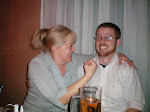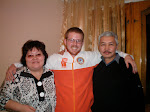Electricity
In my pre-service reading, I learned a lot about the common issues PCVs have with expectations of their PC service both before and after joining the Peace Corps. In a pamphlet entitled “A Few (Minor) Adjustments” I read about how many invitees construct an image of what they expect their PC service to be like, speculating on what their job will be like, what their home life will entail, what they will do for secondary projects, how life in a foreign country will affect them, etc. These anxious and excited trainees get to their training sites or even their permanent posts only to find that their well planned expectations are nothing like the reality of the situation in which they end up living. The danger is that the trainee or volunteer has come to depend on that expectation they created and then can’t cope with the differing points where reality doesn’t correspond. I realized that I, even stepping off the plane in DC to begin staging, didn’t know what to expect. That naivety, or perhaps ignorance or open-mindedness, allowed me to then take things in stride, adapting my few expectations to the reality that I find as I find it bit by bit.
Another “minor adjustment” in the pamphlet was the issue of the iconic “Peace Corps Experience.” Many PCVs feel that they perhaps aren’t really doing any good unless they are suffering, be it sleeping under a lean to, washing in a river, or cooking every day on a campfire. Many, if not most, PCVs are surprised by the comfort of their site and their daily life, and end up feeling like their situation isn’t rugged or hardcore enough to live up to that “PC experience.” I had that feeling when I first stepped in my new home for the fall, seeing my room with bed, desk, and dresser, bigger than my freshman year college dorm room. However, this past week I got a good taste of the rustic life, when our power went out and stayed out for 4 days. Some faulty wiring needed to be replaced and the first guy who worked on it was, as we found out by day 3, somewhat incompetent and was then replaced by another electrician. The first two nights, reading by candlelight and getting around by flashlight were, as a fellow trainee said, quaint. I even got out my camera to take a picture of my desk in my room, covered with Russian language materials, lit up by candles. But when my cell phone and computer finally lost their charge and I still couldn’t run my water distiller to have fresh water, the novelty definitely wore off. Every time I went home I couldn’t help but say to whomever was around, “Man, I hope the electricity works today.” Dinners became very simple, as we couldn’t refrigerate any dairy or meat to keep fresh, but we survived. I can say that I don’t need electricity to get by, but as I type this entry in my well-lit bedroom, listening to my i-pod, sipping on my distilled water, and having just sent a text message on my cell phone, I can say I’m definitely attached to my electronics and therefore dependent on electricity. Maybe just a taste of that rugged Peace Corps Experience is enough for now.
Important Dates
Pre-Service Training is rolling along at a brisk pace (Monday starts week 5 of 12) and in case you feeling like tracking my checkpoints and milestones of PST, here is the breakdown:Week 5 (9/17 – 23) – Teaching two lessons (8th grade), one full lesson by myself and one team-teaching with my Kazakhstani counterpart; Site placement interview to voice preferences for my 2 year post site; 2 2-hr English club sessions; begin work on community project; traditional Kazakh music concert in Almaty
Week 6 (9/24 – 30) – Teaching 3 lessons (8th Grade), some independent, some team-teaching; 2 English Club sessions; Hub Days (9/27 – 28) in Almaty – PC policy training, cross cultural sessions, spending time with other Kaz-19s; plan logistics for community project.
Week 7 (10/1 – 7) – Teach 4 lessons (10th grade), individual and team; 2 English Clubs; Oct 6 Site Placement Announcement; finalize community project plans, begin project.
Week 8 (10/8 – 14) – Teach 5 lessons (?? Grade); 2 Eng. Clubs; conduct and finish community project.
Week 9 (10/15 – 21) – Hub Day (10/15); Counterpart Conference in Almaty – all trainees and their Host Country National (HCN) counterpart participate in weeklong conference at PC headquarters, we will present our community projects to the entire Kaz-19 group + counterparts.
Week 10 (10/22 – 28) – Weeklong Site Visit, interview potential host families; teach 4 lessons at site school, observe 6 lessons.
Week 11 (10/29 – 11/4) – Site Debriefing; teaching, classroom activities, farewell activities/Halloween parties.
Week 12 (11/5 – 9) Language tests (11/4 – 6) in Almaty, Hub Days (11/5 – 6), training and site arrival preparation; Swearing-In Ceremony Nov. 9
Note: All weeks include 15-20 hours of Russian instruction, 2 hours of individual tutoring, 2 hours of Kazakh instructions, and 5 hours of technical and cross cultural instruction.
Community Project
In that list of important dates I mention a few times a community project that is apart from the English Club that we’ve already been conducting. The project can be of varying scope and objective, not necessarily dealing with English. After a meeting on Friday the 14th, we have put into motion the planning for 4 community projects by the 9 PCTs here in Uzunagach. They are: a soccer tournament in which older males serve as coaches and team captains for younger boys in an attempt to mentor the boys in a positive activity outside of school; a dance club that might put on a show at said soccer tournament; English lessons for non-English teaching school teachers, co-lead by local English teachers; and, technical computer training for all interested teachers in hopes of putting their school computers (currently dormant) to use in both lesson planning and class instruction. These projects are just being born, so one or two might fall through or change drastically, but we’re excited about getting them off the ground with the help of other teachers and locals.
Subscribe to:
Post Comments (Atom)
.jpg)








No comments:
Post a Comment